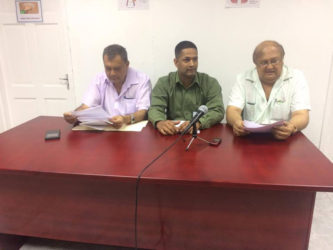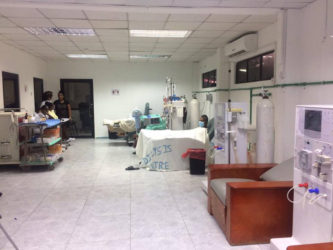Despite the fact that the Georgetown Public Hospital (GPH) Dialysis Unit is being utilized to its capacity, it has recorded 37 mortalities for the year so far because the number of patients surpasses its resources.
Currently, the unit treats approximately 120 patients who need hemodialysis and peritoneal dialysis. It has seven machines, two of which are only used in cases of emergencies.
Head of the unit Dr Kishore Persaud, during a press conference on Friday, explained that patients are desperate to find affordable means of taking care of themselves. “The situation at hand is that these patients are suffering and need help,” he said. “We can only do so much with the resources we have. We need help at the ministry level and the government level to find the cheapest possible way forward to offer the people a solution at an affordable cost.”

He stressed that in many cases, patients who could have once afforded treatment at a private institution, would often turn to the public health facility when their finances are exhausted.
Persaud said the matter is one of urgency and has been brought to the attention of Minister of Public Health Dr George Norton. The option of outpatient dialysis clinics was proposed to Norton who promised to make the recommendation to Cabinet before responding to the proposal, Persaud said.
He disclosed that a possible solution would be to create satellite units across the country to address the needs of patients.
There have been preliminary discussions with 5G Dialysis Centre, a private entity, which is willing to set up the satellite units across the country to the tune of $250 million a year to treat 100 patients.
If such a system comes into place, Persaud said, the mortality rate would be reduced significantly since patients would be able to benefit from effective treatment and care, dialysis sessions and reduction in cost. “We would utilize this as the territory hospital and treat the acute patients and administer the effective treatment. That would help to minimize the cost,” he added.
The cost to the GPH Dialysis Unit, if it continues to offer free service, is also $250 million per annum. “5G’s cost and our cost is almost the same but we would benefit from being able to dialyse all the patients. Right now we are using that amount of money to treat our inpatients at the hospital,” he disclosed.
However, he stressed that there has to be consultation between the hospital and government before the vision can become a reality. “Dialysis… costs more than cancer treatment. We need a panel discussion [on] a more affordable way forward,” he emphasized.

Osafo George, who is the director of 5G Dialysis Centre and the first provider of dialysis treatment in Guyana, said “The amount of money projected to be spent on dialysis here [GPH] can be spent more efficiently” across the country with the setting up of satellite units.
“We have laid out plans for a solution. We are saying if you partner with us we will deliver a higher quality of care for the same money for patients. Most of our patients have been able to go back to work,” he explained.
He added that 5G had approached the government and management of the hospital to partner to reduce the cost since its establishment in 2005 and is still awaiting a decision to date.
The company is offering to provide the necessary three sessions per week, the machines, maintenance, staff and a higher standard of care for all patients.
Persaud feels it is a plan government should seize if it wants to reduce deaths among dialysis patients.
Meanwhile, he pointed out that the unit is understaffed with one nephrologist, a transplant surgeon, a dietitian, a social worker, a pharmacist, secretary, two peritoneal dialysis nurses and six hemodialysis nurses along with general nurses, who work beyond the call of duty with the resources they have.
The unit operates six days a week. At present it offers hemodialysis where the patient’s blood is filtered through a machine removing the waste and extra fluid from the blood before returning it to the body. Patients receiving peritoneal dialysis have to go through a daily process where a solution is (dialysate) is used to remove waste and extra fluid from the body.
At present, the unit treats an average of 60 outpatients on Mondays and Fridays, and 35 to 40 inpatients daily.
Persaud said the rising cost of dialysis treatment has become a burden and some patients have find alternative methods, while the unit offers limited treatment to patients who are not suffering tremendously. However, he disclosed, while that is the scenario, it should not be accepted since it results in the mortality rate going up.
Dialysis costs between $12,000 and $18,000 per session at various centres. The minimum cost per week is $36,000 for a patient, Persaud highlighted, pointing out that the high cost plus cuts in subventions to private institutions lead to patients not being able to afford treatment.
“Our centre is overburdened by the number of patients in the hospital. We cannot afford all patients dialysis because of the economic burden,” he said. He lamented that in many instances, patients get admitted to the public hospital and cannot be discharged, because they have no plan to get treatment once they leave. And even if they are discharged they return and are readmitted, taking up “residency status.”
There have been multiple discussions on this topic, Persaud stated explaining that finances have to be sought at a level higher than the hospital. “I don’t think the budget for the hospital can cater for dialysis, it would take up a large chunk…. We need to seek an alternative plan to see how we can handle this situation,” he stressed.
Chairman of the Georgetown Public Hospital Corporation Dr Carl ‘Max’ Hanoman has issued a call for a private-public partnership to aid the situation. “Let’s develop the hospital with more machines, more peripheral centres, let’s go in to partnerships with private individuals so Guyanese can have a better delivery of care,” he said.
“We try our best with limited resources and space. We are doing the best we could. The centre has come a far way. We have our limitations, but we would like to progress further. We are financially starved to treat all the dialysis patients of this country. I am made to understand there are 110 to 120 patients that need treatment at present. Let’s get corporate Guyana to get involved and start a kidney foundation and find help for the people,” Dr Hanoman said.





